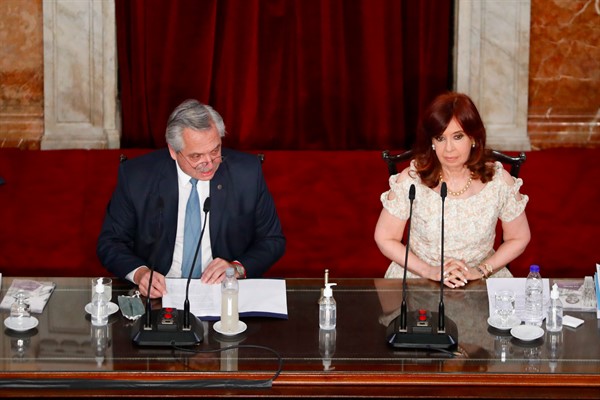In a vitriolic address to Argentina’s Congress on March 1, President Alberto Fernandez put to rest any illusions that he would be a moderating influence on his vice president and political mentor, former President Cristina Fernandez de Kirchner. (The two are unrelated.) During his speech, the president attacked Cristina Fernandez’s traditional enemies, including the press, the judiciary and the political opposition. More surprisingly, he also criticized the International Monetary Fund, despite being in the middle of discussions to renegotiate Argentina’s $44 billion debt.
In fact, the president claimed to be “in no rush” to reach an agreement with the IMF, although just weeks earlier, his finance minister, Martin Guzman, had promised a deal by May. Further, Fernandez accused the IMF of having granted the loan in 2018 to bolster the reelection chances of his pro-business predecessor, Mauricio Macri. Shocking many of the lawmakers in attendance, Fernandez announced a lawsuit against Macri and other former officials for what he deemed “reckless” borrowing. Rejecting these allegations, Macri claims the loan was needed to cover the deficit he inherited from Cristina Fernandez. In any event, the IMF’s support did not stabilize the economy and Macri lost the 2019 election to the Fernandez-Fernandez ticket.
During his speech, President Fernandez also flatly refused to implement structural economic reforms, which would be a precondition for any deal with the IMF—not to mention a practical necessity given that Argentina’s fiscal deficit in 2020 reached 8.5 percent of GDP. While Guzman concluded a restructuring of the country’s foreign debt that is owed to private creditors last August, Argentina remains largely shut off from the global financial system. The Central Bank’s foreign reserves are also near zero, making it impossible for Argentina to make scheduled payments to the IMF of $18 billion in 2022 and $19 billion in 2023.

